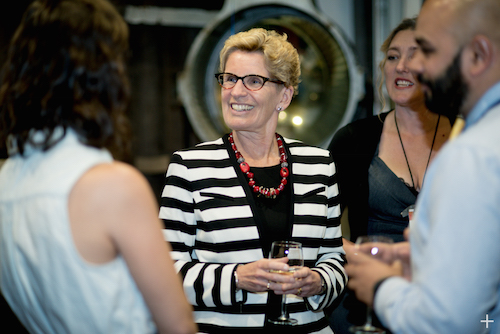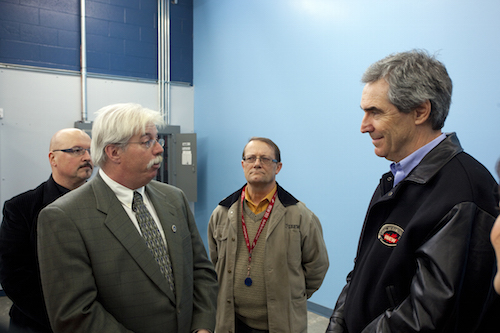Few things offer a path to the Ontario middle class better than a 309A license, awarded to a construction electrician after completion of an apprenticeship. It guarantees Red Seal certification, allowing its holders to move easily for work between the provinces.

|
Ontario Premier Kathleen Wynne (center) has been viewed as pro-worker during her tenure, but labour representatives are concerned trades will be devalued following recent decisions by the provincial government.
CREDIT: Creative Commons license from Flickr user Jason Hargrove.
|
IBEW leaders fear that license is under attack after the provincial government moved quickly in November to adopt the Dean Report, issued by former Ontario Public Service head and current University of Toronto professor Tony Dean following his year-long review of the Ontario College of Trades.
“Our trade is viewed as something of value,” said John Grimshaw, executive secretary/treasurer of the IBEW Construction Council of Ontario. “To go out and get a license means something. You’re hiring properly qualified, highly trained, skilled electricians.”
Trade licensing and worker training is handled by provincial governments in Canada. Since 2013, it has been overseen in Ontario – Canada’s largest province with about 14 million people – by the College of Trades.
Dean’s report recommends that when two or more trades are allowed to do the same work, employers can hire anyone to do that work, not just from the unions that train their workers to do so.
For instance, if the IBEW and another union are both allowed to install conduit on a construction site, contractors can now hire less skilled workers who often are nonunion. Toronto Local 353 Business Manager Steven Martin said a journeyman electrician makes about $60 per hour. Unskilled workers make around $16, he said.
Proponents of Dean’s report say the move will drive down unemployment, but Martin and other IBEW officials think the opposite will happen. Instead, it will make it difficult to attract qualified applicants to apprenticeship programs because wages will drop, he said.
“If they start spinning the trade off and allowing anyone to do the menial parts of the job, it makes that job much less attractive,” he said.

|
Toronto Local 353 Business Manager Steven Martin (left foreground) visits with former national Liberal Party leader Michael Ignatieff. Martin says Local 353 will not participate in any Liberal Party fundraisers or activities after the provincial government quickly adopted recommendations that union leaders say are harmful to labour in Ontario.
CREDIT: Creative Commons license from Flickr user Randy Barrack.
|
The public has a right to be concerned too, First District International Representative Bruce McNamara said. McNamara noted unskilled workers will be allowed to install raceway wiring, an enclosed channel of metal or nonmetallic materials designed expressly for holding wires or cables.
Trained apprentices are taught both bonding and grounding when installing raceway, McNamara said. Nonskilled workers often are not.
“It boils down to public safety,” Martin said. “If you have unskilled people doing skilled labour, that is a factor.”
IBEW and other trades leaders also are disappointed in Dean’s recommendation to remove most of the College of Trade’s enforcement power. College representatives visit job sites to make sure contractors are using workers in the appropriate job classifications. Those who don’t are subject to fines.
Now, contractors will be allowed to appeal any penalties to the Ontario Labour Relations Board. They also will not have to pay the fines until the appeal process is completed. Martin said he is urging provincial officials to at least remove this designation because it cripples the college’s enforcement arm.
What makes it all even more troubling for Grimshaw, Martin and others is that Dean’s recommendations were accepted by a provincial government in which the Liberal Party has a working majority. Labour has campaigned heavily for Liberals in provincial elections in recent years. Dean largely has been viewed as a friend of unions during his time as a public servant and academic.
Local 353 responded by declining to send representatives to a Liberal Party fundraising dinner in December, leaving its table empty, Martin said. He’s written a letter to Premier Kathleen Wynne, stating that Local 353 will no longer attend Liberal Party functions until “such time as your government refocuses on the values on which you were voted into office.”
McNamara said he suspects backers of Dean’s report want unskilled or nonunion labour to complete much of the work before having union tradesmen arrive on site to make sure it is done correctly. It’s a way to cut costs and still take advantage of skilled union workers. It also could compromise public safety and cripple the Ontario economy.
“Basically, what they’re trying to do is splinter the trades and take out portions deemed unskilled, which means anyone can do it,” he said.
Grimshaw said he met with Dean three times during the review process, but he is disappointed the IBEW and other trade unions weren’t allowed to study the report and give its reaction before the release in mid-November.
“We are very concerned that there are significant changes being proposed in the Dean Report that will affect us and others trades,” he said. “Yet, the industry is being presented with the report without the opportunity to comment on significant changes that will affect us. That is a mistake.”